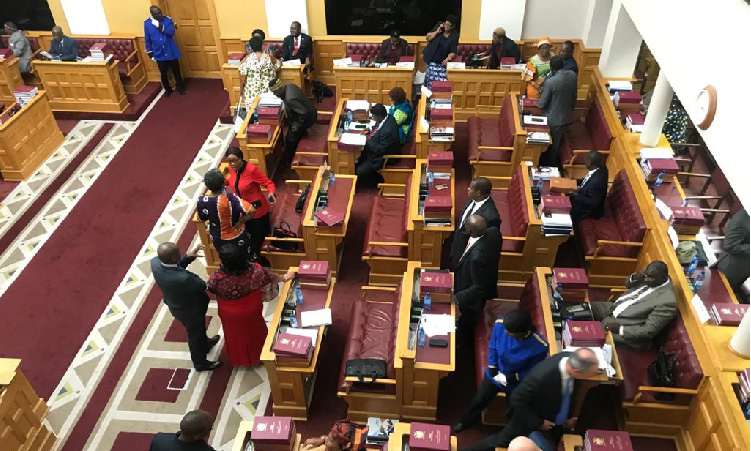LEGISLATION to prevent money laundering and to investigate suspicious financial transactions returned to the National Assembly this week after it was withdrawn in February because of technical shortcomings and errors.
The Financial Intelligence Bill will introduce mechanisms and measures aimed at preventing and combating money laundering. It sets up a framework procedure that encourages voluntary compliance and self-regulation by institutions that may be exploited for money-laundering purposes.The Bill aims to maintain the integrity of the financial system.The Bank of Namibia will establish a Financial Intelligence Centre (FIC).”It will be a purely administrative institution whose main objective is to reach into the financial system, collect and analyse financial information,” said Deputy Finance Minister Tjekero Tweya, who tabled the Bill.”Other functions are to freeze suspicious moneys found in the financial system and to investigate money laundering.The findings of the FIC will be passed to the relevant law-enforcement agencies for further investigation in accordance with the Prevention of Organised Crime Act of 2004.”This might be a thin line in the segregation of duties between offices like the Police, the Central Intelligence Service or the Anti-Corruption Commission – a criticism raised in February – Tweya pointed out, but their duties complemented each other.”All cases investigated by these institutions will ultimately end up with the Prosecutor General’s office and the courts,” he said.Regarding the autonomy of the FIC as a department of the Bank of Namibia, the Bank would report to the FIC and the Centre would “enjoy a degree of autonomy from the BoN,” Tweya said.The transfer of large sums of cash to and from Namibia will have to be reported in advance to the Financial Intelligence Centre once the bill becomes law.A financial action task force within the Ministry of Finance has set up a working group to research and provide policy guidelines on how to deal with people who have no bank accounts and cash couriers.The Bill also provides for the establishment of a Money-Laundering Advisory Council.It will advise on policies and measures to combat money laundering and act as a forum for consultations.The director of the Anti-Corruption Commission and the president of the Bankers’ Association will also serve on the Council.It sets up a framework procedure that encourages voluntary compliance and self-regulation by institutions that may be exploited for money-laundering purposes.The Bill aims to maintain the integrity of the financial system.The Bank of Namibia will establish a Financial Intelligence Centre (FIC).”It will be a purely administrative institution whose main objective is to reach into the financial system, collect and analyse financial information,” said Deputy Finance Minister Tjekero Tweya, who tabled the Bill.”Other functions are to freeze suspicious moneys found in the financial system and to investigate money laundering.The findings of the FIC will be passed to the relevant law-enforcement agencies for further investigation in accordance with the Prevention of Organised Crime Act of 2004.”This might be a thin line in the segregation of duties between offices like the Police, the Central Intelligence Service or the Anti-Corruption Commission – a criticism raised in February – Tweya pointed out, but their duties complemented each other.”All cases investigated by these institutions will ultimately end up with the Prosecutor General’s office and the courts,” he said.Regarding the autonomy of the FIC as a department of the Bank of Namibia, the Bank would report to the FIC and the Centre would “enjoy a degree of autonomy from the BoN,” Tweya said.The transfer of large sums of cash to and from Namibia will have to be reported in advance to the Financial Intelligence Centre once the bill becomes law.A financial action task force within the Ministry of Finance has set up a working group to research and provide policy guidelines on how to deal with people who have no bank accounts and cash couriers.The Bill also provides for the establishment of a Money-Laundering Advisory Council.It will advise on policies and measures to combat money laundering and act as a forum for consultations.The director of the Anti-Corruption Commission and the president of the Bankers’ Association will also serve on the Council.
Stay informed with The Namibian – your source for credible journalism. Get in-depth reporting and opinions for
only N$85 a month. Invest in journalism, invest in democracy –
Subscribe Now!









